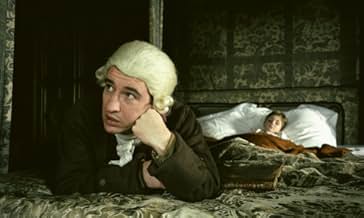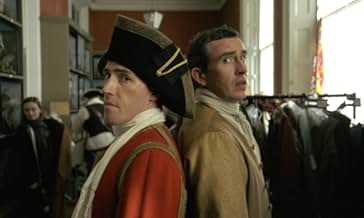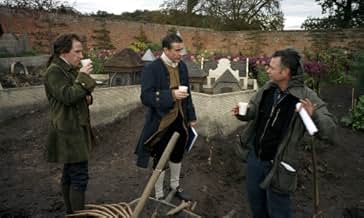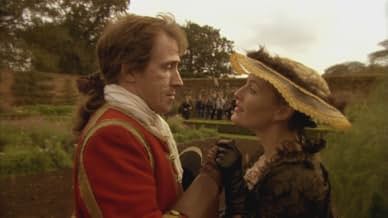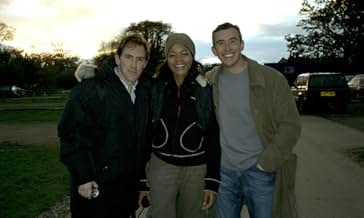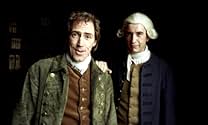IMDb-BEWERTUNG
6,7/10
13.478
IHRE BEWERTUNG
Regisseur Michael Winterbottom (Northam) versucht, die Adaption von Laurence Sternes im Wesentlichen unverfilmbarem Roman "The Life and Opinions of Tristram Shandy, Gentleman.Regisseur Michael Winterbottom (Northam) versucht, die Adaption von Laurence Sternes im Wesentlichen unverfilmbarem Roman "The Life and Opinions of Tristram Shandy, Gentleman.Regisseur Michael Winterbottom (Northam) versucht, die Adaption von Laurence Sternes im Wesentlichen unverfilmbarem Roman "The Life and Opinions of Tristram Shandy, Gentleman.
- Regie
- Drehbuch
- Hauptbesetzung
- Nominiert für 1 BAFTA Award
- 2 Gewinne & 14 Nominierungen insgesamt
Empfohlene Bewertungen
In trying to film a movie based on the novel Tristam Shandy, it is explained that this book is utterly unfilmable. modestly rather, they show the actual process of trying to make this movie while discussing the parts of the book that displayed meaning so they can decide what scenes will be added/cut in the movie. Cleverly enough, this entire process serves as a metaphor for the actual book and the digressive nature of it. Maybe not the most interesting topic to watch, but it is done well enough for you to be curious as to how everything is resolved. If you don't get the metaphor, you will not like the movie. If you do, you might be as delighted as ever that something quite unique has just been viewed.
didn't i just sound ridiculous?
didn't i just sound ridiculous?
Michael Winterbottom's movie is an Altmanesque production depicting an English crew shooting Laurence's Sterne's eccentric eighteenth-century literary classic. It begins wittily and appropriately with Steve Coogan exchanging mocking banter with costar Rob Bryden, and then Coogan, with cosmetically enlarged and crooked nose and proper costume, becomes Shandy introducing himself. The essentials of the book are sketched in -- first of all, Tristram's meandering account of his childhood and birth (not in any logical order -- nor should they be -- and intersperced with Coogan's caustic comments on the child actors playing him at earlier stages -- which perfectly fits in with Sterne's tendency to interrupt himself on the slightest pretext); then, Uncle Toby (Rob Briden) and his obsession with his exploits at the Battle of Naumur, which include an injury whose location he studiously avoids explicating. The mishaps surrounding Tristram's birth start with his name and move on to the forceps -- then a new device -- whose clumsy use by Dr. Slop cause the altered nose. A falling window caused even more crucial damage.
The moment of birth is dwelt upon -- then the camera cuts back to the crew and the focus shifts to the Coogan-Bryden rivalry again, Steve's girlfriend and their baby, his own problems in bed, his flirtation with a pale-coffee-colored lady crew member who's a great film buff. Coogan wants his shoes made with higher heels so he's taller than Bryden. The filmmakers hold endless confabs over how to do a battle scene and whether to bring in the romance with Widow Wadham (to be played by Gillian Anderson, who agrees from Los Angeles with comic alacrity). Anderson's presence brings in more money for the battle, and then both the battle and the romance are left out of the final cut. Much hilarity accompanies these details, though the main focus is on Coogan's stardom and inability to have a minute to himself.
Unfortunately once Winterbottom pulls away from the birth scene, the Sterne novel, which pretty much ranks with Fielding's "Tom Jones" for brilliance and humor, somewhat falls by the wayside never to be recovered till just before the end, when it seems tacked back in as a hasty afterthought. And hasty is one thing Sterne never is: impulsive and quirky, but never, never, never -- oh, my Heavens No! -- not rushed. At novel's end, his main character, after all, has still not been born.
Maybe it means something that only one member of the cast is reported to have ever actually read "Tristram Shandy" through to the end. Neither Coogan nor Bryden seems particularly eighteenth-century in their role, and Bryden's isn't a particularly inspired recreation of Uncle Toby. Nobody is amiably eccentric to the right degree.
Winterbottom has made an intermittently quite funny movie that never loses its pace, but he has recreated Robert Altman rather than Laurence Sterne, and when you realize this, if you care at all about the novel, the whole enterprise, despite its frantic energy, becomes, for all its wit and good humor, a little bit of a drag. This is an enormously clever film, but what seems brilliant on paper doesn't always play for keeps.
The moment of birth is dwelt upon -- then the camera cuts back to the crew and the focus shifts to the Coogan-Bryden rivalry again, Steve's girlfriend and their baby, his own problems in bed, his flirtation with a pale-coffee-colored lady crew member who's a great film buff. Coogan wants his shoes made with higher heels so he's taller than Bryden. The filmmakers hold endless confabs over how to do a battle scene and whether to bring in the romance with Widow Wadham (to be played by Gillian Anderson, who agrees from Los Angeles with comic alacrity). Anderson's presence brings in more money for the battle, and then both the battle and the romance are left out of the final cut. Much hilarity accompanies these details, though the main focus is on Coogan's stardom and inability to have a minute to himself.
Unfortunately once Winterbottom pulls away from the birth scene, the Sterne novel, which pretty much ranks with Fielding's "Tom Jones" for brilliance and humor, somewhat falls by the wayside never to be recovered till just before the end, when it seems tacked back in as a hasty afterthought. And hasty is one thing Sterne never is: impulsive and quirky, but never, never, never -- oh, my Heavens No! -- not rushed. At novel's end, his main character, after all, has still not been born.
Maybe it means something that only one member of the cast is reported to have ever actually read "Tristram Shandy" through to the end. Neither Coogan nor Bryden seems particularly eighteenth-century in their role, and Bryden's isn't a particularly inspired recreation of Uncle Toby. Nobody is amiably eccentric to the right degree.
Winterbottom has made an intermittently quite funny movie that never loses its pace, but he has recreated Robert Altman rather than Laurence Sterne, and when you realize this, if you care at all about the novel, the whole enterprise, despite its frantic energy, becomes, for all its wit and good humor, a little bit of a drag. This is an enormously clever film, but what seems brilliant on paper doesn't always play for keeps.
Just saw this at the New York Film Festival, where it was met with the wild enthusiasm and raucous laughter it so fully deserves.
I intentionally avoided reading any reviews before I went, as I was so curious to see how Winterbottom (whose "24-Hour Party People" I had loved) would approach this bear of a book.
The film begins with the two stars getting made-up and chatting about the size of their roles and the color of their teeth (the actors, who appeared with Winterbottom in the post-screening Q&A at the festival, assured the audience that this opening scene, as well as their conversation over the end credits, was completely improvised). The scene shifts to Tristram Shandy beginning the narration of his life with an anecdote about Groucho Marx--and proceeds to go wild from there.
The cast is made up of some of the finest actors in British television--apart from the two leads, Dylan Moran of "Black Books" and David Walliams of "Little Britain" appear, as well as Stephen Fry, Shirley Henderson, and a host of others, including a splendid turn by Keeley Hawes in a role that consists of little more than labor pains and screaming--and one American: Gillian Anderson in a couple of wonderful scenes, one as herself and the other as the Widow Wadman.
As one of the actors observes in the film, Laurence Sterne had written "a post-modern novel before modernism had even been invented," and Winterbottom honors that admirably.
I intentionally avoided reading any reviews before I went, as I was so curious to see how Winterbottom (whose "24-Hour Party People" I had loved) would approach this bear of a book.
The film begins with the two stars getting made-up and chatting about the size of their roles and the color of their teeth (the actors, who appeared with Winterbottom in the post-screening Q&A at the festival, assured the audience that this opening scene, as well as their conversation over the end credits, was completely improvised). The scene shifts to Tristram Shandy beginning the narration of his life with an anecdote about Groucho Marx--and proceeds to go wild from there.
The cast is made up of some of the finest actors in British television--apart from the two leads, Dylan Moran of "Black Books" and David Walliams of "Little Britain" appear, as well as Stephen Fry, Shirley Henderson, and a host of others, including a splendid turn by Keeley Hawes in a role that consists of little more than labor pains and screaming--and one American: Gillian Anderson in a couple of wonderful scenes, one as herself and the other as the Widow Wadman.
As one of the actors observes in the film, Laurence Sterne had written "a post-modern novel before modernism had even been invented," and Winterbottom honors that admirably.
A film so post-post-postmodern that Steve Coogan steps out of the screen and hits on your girlfriend in the theater lobby -- I won't say if this is true or not -- Tristram Shandy is a meticulously controlled work that, despite the film-within-a-film conceit, is very faithful to its impenetrable source. Just like Sterne's book, the engine of Winterbottom's film is bittersweet melancholy, but the engine noise, drowning out what some might consider to be a nihilistic message, is bawdy, music-hall, veddy veddy English humor.
For Americans to get anything out of this movie, you will need to understand a bit about both Tristram Shandy -- at least enough to know that Coogan is playing Shandy's FATHER and that Shandy himself is only the narrator -- and about Steve Coogan's mythology. For those who are too lazy, all you need to know is that Coogan doesn't have a reputation for being led around by his brain. I have briefly met him in person and found the experience uncanny. He is so fully what he is that he seems to have a force-field around him that separates him from the more amorphous mass of humanity. In the future, when you say the word "Coogan," it will instantly paint a picture of a certain type of male. A type that women are drawn to irresistibly, because he is both a child in need of mothering, a grown Linus Van Pelt perpetually clutching a security blanket, and aggressively sexual and dirty. He's the bad boy and the baby all rolled into one. And yet, far from being a jerk or a cad, he is intensely likable.
All of which goes to show that rarely has any actor been more perfect for a role than Coogan is here. Posing this hapless man-child next to a bull with a huge bazoing pretty much says it all. You see, Sterne is not a fan of the procreative arts ( and judging by his last few movies, neither is Winterbottom; "Everyone's kid is so special," says Samantha Morton in Code 46, "Makes you wonder where all the ordinary adults come from." ) The title character of Tristram Shandy remains famously unborn, and the only characters that Sterne truly loves, and who truly love each other, are a eunuch and a widow, all of which goes to show that Sterne considers death to be a blessing and human existence to be largely unnecessary, nothing but the byproduct of mindless sexual flare-ups that would be quickly forgotten except for the babies they produce, who in turn have more sexual flare-ups, and so on. In the film these flare-ups come courtesy of Steve Coogan, playing both himself as a father -- and constantly attempting to cheat on his wife, as he is famous for doing in real life; you may even recall the false alarm that he'd knocked up Courtney Love! -- and also the reluctant Shandy's paterfamilias. Between these two Johnny Appleseeds, both of whom look like Steve Coogan, entire planetary systems could be populated and repopulated.
The film is short, but dense -- every scene has so many dimensions that the end result fans out like a peacock's tail. There are infinite details to sift through in its 90 minute running time, and there is a very beautifully done telescoping of time periods to match Tristram Shandy's 18th-century milieu with that of Steve Coogan's and our own modern day. When Coogan haggles over a script in the lobby of a trendily underlit London hotel, you feel somehow transported back to Shandy's father's palatial home and its elegant candlelight. The central scene of the film comes when Coogan, escaping from a costume party where the 21st century briefly crashes into the 18th, tells his wife: "I just had a nightmare." That nightmare is called our world, reality, human as opposed to divine love, the world controlled by time yet where nothing really changes except the clothes and the hairstyles, and that, despite its obvious wretchedness and pain, people are too afraid to give up; yes, the very same "cock and bull story" of the title. It is not every comedian who has something to say about the human comedy. But Coogan certainly does, under Michael Winterbottom's expert and disillusioned hand.
For Americans to get anything out of this movie, you will need to understand a bit about both Tristram Shandy -- at least enough to know that Coogan is playing Shandy's FATHER and that Shandy himself is only the narrator -- and about Steve Coogan's mythology. For those who are too lazy, all you need to know is that Coogan doesn't have a reputation for being led around by his brain. I have briefly met him in person and found the experience uncanny. He is so fully what he is that he seems to have a force-field around him that separates him from the more amorphous mass of humanity. In the future, when you say the word "Coogan," it will instantly paint a picture of a certain type of male. A type that women are drawn to irresistibly, because he is both a child in need of mothering, a grown Linus Van Pelt perpetually clutching a security blanket, and aggressively sexual and dirty. He's the bad boy and the baby all rolled into one. And yet, far from being a jerk or a cad, he is intensely likable.
All of which goes to show that rarely has any actor been more perfect for a role than Coogan is here. Posing this hapless man-child next to a bull with a huge bazoing pretty much says it all. You see, Sterne is not a fan of the procreative arts ( and judging by his last few movies, neither is Winterbottom; "Everyone's kid is so special," says Samantha Morton in Code 46, "Makes you wonder where all the ordinary adults come from." ) The title character of Tristram Shandy remains famously unborn, and the only characters that Sterne truly loves, and who truly love each other, are a eunuch and a widow, all of which goes to show that Sterne considers death to be a blessing and human existence to be largely unnecessary, nothing but the byproduct of mindless sexual flare-ups that would be quickly forgotten except for the babies they produce, who in turn have more sexual flare-ups, and so on. In the film these flare-ups come courtesy of Steve Coogan, playing both himself as a father -- and constantly attempting to cheat on his wife, as he is famous for doing in real life; you may even recall the false alarm that he'd knocked up Courtney Love! -- and also the reluctant Shandy's paterfamilias. Between these two Johnny Appleseeds, both of whom look like Steve Coogan, entire planetary systems could be populated and repopulated.
The film is short, but dense -- every scene has so many dimensions that the end result fans out like a peacock's tail. There are infinite details to sift through in its 90 minute running time, and there is a very beautifully done telescoping of time periods to match Tristram Shandy's 18th-century milieu with that of Steve Coogan's and our own modern day. When Coogan haggles over a script in the lobby of a trendily underlit London hotel, you feel somehow transported back to Shandy's father's palatial home and its elegant candlelight. The central scene of the film comes when Coogan, escaping from a costume party where the 21st century briefly crashes into the 18th, tells his wife: "I just had a nightmare." That nightmare is called our world, reality, human as opposed to divine love, the world controlled by time yet where nothing really changes except the clothes and the hairstyles, and that, despite its obvious wretchedness and pain, people are too afraid to give up; yes, the very same "cock and bull story" of the title. It is not every comedian who has something to say about the human comedy. But Coogan certainly does, under Michael Winterbottom's expert and disillusioned hand.
Oh gosh, what a disappointment. Its something like that Peter Fonda "Tempest" set in the Bayou. It has the same fabric as the play's outer dressing and none of the muscle and blood of the thing.
Alas. One of our most intelligent filmmakers, someone who thinks about film and actually has new, clever ideas. Pay attention to "9 Songs" if you can and you'll be blown away. And one of our richest books. We don't have many in English, now that Ireland is a theme park for tourists. This book is not only folded in marvelous, manifold ways (many would say self- referential, but that's unduly limiting), it is a milestone in literature absolutely.
The problem with the film is aptly noted in the film. At some point, they decided that every effect, every narrative overlay, would be done for comic effect and no other. So. You'll find this amusing, slightly, with only one style of humor served up a couple different ways.
You will find better humor that plays with these notions elsewhere. At least, in true folded form, they tell us why in the film. Its because the guys in charge only understand "funny." There are some wonderful metabits where "deep" cinematic effect is brought up in discussions and the "guys in charge" are completely oblivious. It isn't like that opening scene in "The Player" where cinematic pretense is made fun of, and then ruthlessly exploited. No. Here the film really does ignore everything it was intended to be.
I'll have to wait, I suppose, for a Winterbottom project that has a less clever source, so he can add his own notions, rather than be faced with a warehouse of attitudes and only grab those on the bottom shelf.
Every scene with Naomie Harris is worth watching, in content and style. The rest, well, watch "The Company" instead if you just want to laugh, of "Singing Detective" if you want Shandy in film.
Ted's Evaluation -- 2 of 3: Has some interesting elements.
Alas. One of our most intelligent filmmakers, someone who thinks about film and actually has new, clever ideas. Pay attention to "9 Songs" if you can and you'll be blown away. And one of our richest books. We don't have many in English, now that Ireland is a theme park for tourists. This book is not only folded in marvelous, manifold ways (many would say self- referential, but that's unduly limiting), it is a milestone in literature absolutely.
The problem with the film is aptly noted in the film. At some point, they decided that every effect, every narrative overlay, would be done for comic effect and no other. So. You'll find this amusing, slightly, with only one style of humor served up a couple different ways.
You will find better humor that plays with these notions elsewhere. At least, in true folded form, they tell us why in the film. Its because the guys in charge only understand "funny." There are some wonderful metabits where "deep" cinematic effect is brought up in discussions and the "guys in charge" are completely oblivious. It isn't like that opening scene in "The Player" where cinematic pretense is made fun of, and then ruthlessly exploited. No. Here the film really does ignore everything it was intended to be.
I'll have to wait, I suppose, for a Winterbottom project that has a less clever source, so he can add his own notions, rather than be faced with a warehouse of attitudes and only grab those on the bottom shelf.
Every scene with Naomie Harris is worth watching, in content and style. The rest, well, watch "The Company" instead if you just want to laugh, of "Singing Detective" if you want Shandy in film.
Ted's Evaluation -- 2 of 3: Has some interesting elements.
Wusstest du schon
- WissenswertesThe credited writer Martin Hardy is actually a pseudonym for the writer Frank Cottrell Boyce, who had his name taken off the film after a falling-out with longtime collaborator Michael Winterbottom.
- Zitate
Rob Brydon: The thing is, I can't act...
Steve Coogan: I know that.
Rob Brydon: ...with Gillian Anderson. I have a sexual thing for Gillian Anderson.
- Crazy CreditsOpening credits have (intentional) spacing issues, and mismatched fonts.
- Alternative VersionenJust as with "In This World," the British DVD features a 1.78:1 transfer of the film. Although the film was shot for release in theaters at 2.35:1, because it was made on DV, the total space of the filmed image was 1.78. The film was masked for theatrical release, as the director intended. However, for DVD release, the film was transferred open matte. Again, like "In This World," only the American DVD respects the theatrical aspect ratio of 2.35:1.
- VerbindungenFeatured in The South Bank Show: Michael Winterbottom (2005)
- SoundtracksChasing Sheep is Best Left to Shepherds
from The Draughtman's Contract Music
Composed by Michael Nyman
Published by Chester Music Limited
Performed by the Michael Nyman Band
Top-Auswahl
Melde dich zum Bewerten an und greife auf die Watchlist für personalisierte Empfehlungen zu.
- How long is Tristram Shandy?Powered by Alexa
Details
- Erscheinungsdatum
- Herkunftsland
- Sprache
- Auch bekannt als
- Tristram Shandy: A Cock and Bull Story
- Drehorte
- Produktionsfirmen
- Weitere beteiligte Unternehmen bei IMDbPro anzeigen
Box Office
- Budget
- 2.800.000 £ (geschätzt)
- Bruttoertrag in den USA und Kanada
- 1.253.413 $
- Eröffnungswochenende in den USA und in Kanada
- 60.886 $
- 29. Jan. 2006
- Weltweiter Bruttoertrag
- 3.931.982 $
- Laufzeit1 Stunde 34 Minuten
- Farbe
- Sound-Mix
- Seitenverhältnis
- 2.35 : 1
Zu dieser Seite beitragen
Bearbeitung vorschlagen oder fehlenden Inhalt hinzufügen

Oberste Lücke
By what name was A Cock and Bull Story (2005) officially released in India in English?
Antwort

